The London Fluids Colloquium aims to bring together researchers in Fluid Dynamics in London. The Colloquium will take place once a term at a London Institution on a Friday at 2-5pm. Each colloquium will feature short early career researcher talks and one seminar length talk from an invited researcher. There will be refreshments following the talks and an opportunity to discuss and meet other fluids researchers. The series is open to researchers from across London and is free to attend.
To receive emails about upcoming London Fluids Colloquium events please subscribe to our mailing list via this link.
Upcoming colloquium
The next colloquium will be held at Imperial College London, Friday 12th December 2025 2-5pm.
| 2:05-2:30pm | Cyan White (Department of Mathematics, UCL), Exact solutions for vortex equilibria by conformal mapping |
|---|---|
| 2:30-2:55pm | Freya Bull (Department of Mathematics, UCL), Multi-scale modelling of blood rheology in sickle cell disease |
| 3:00-3:50pm | Björn Hof (Institute of Science and Technology Austria) [website], The turbulence problem — the wrong control parameter and one of the Martians |
| Abstract: While the issue of what drives the transition to turbulence in pressure-driven pipe flow appears to be a basic, down-to-earth problem, somehow things got out of control. | |
| 4:00-5:00pm | Discussions over refreshments |
Location
The colloquium will take place in Clore Lecture Theatre (213), Huxley Building, 180 Queen's Gate.
The Department of Mathematics / Huxley Building is a 10-15 minute walk from South Kensington and Gloucester Road stations. Clore Lecture Theatre is on the ground floor (level 2), just inside the Queen's Gate main entrance. (If entering Huxley Building from the Sherfield Walkway on level 3, it is just down the stairs.) Refreshments will be served in the Level 5 Common Room, accessed from lifts/stairs just outside Clore.
Past colloquia
Friday 23rd May 2025 at UCL:
| 2:05-2:30pm | Beth Clarke (Department of Mathematics, Imperial College London), Using structural anisotropy to stabilise asymmetric beating in instability driven filaments |
|---|---|
| 2:30-2:55pm | Anna Curran (Department of Mathematics, Imperial College London), A theoretical study of the regularisation of stagnant caps of surfactant |
| 3:00-3:50pm | Matthew Juniper (Department of Engineering, University of Cambridge), Information flows: probability, inference, and information in fluid mechanics. |
| 4:00-5:00pm | Discussions over refreshments |
Organisers
Ory Schnitzer (Department of Mathematics, Imperial College London)
Eric Keaveny (Department of Mathematics, Imperial College London)
Edwina Yeo (Department of Mathematics, University College London)
Catherine Kamal (Department of Mathematics, University College London)
Gunnar Peng (Department of Mathematics, University College London)
Sponsors
We gratefully acknowledge support from the EPSRC National Fellowships in Fluid Dynamics scheme (Grant number EP/X027902/1) and the Department of Mathematics at Imperial College London.
